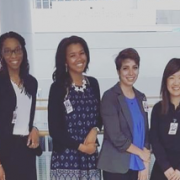Addressing the Needs of the Autism Community in China
Post by Marianne Chen, MSW candidate ’15, who interned in Shanghai, China
Before grad school, I worked on autism research that focused on early identification and early intervention. My interest in experimental research shifted after noticing how socio-economic factors affect the implementation and impact of intervention. This led me to discovering research on disparities in early diagnosis and access to early intervention services among racial-ethnic populations in the United States. After that, the matter of social justice and the practicality of transferring research into the real world setting were what led me to the dual degree program in social welfare and public health at UCLA.
Fast forward a couple years and I find myself interning at Autism Speaks in New York for my MPH field placement. The public health team at Autism Speaks is comprised of individuals who are committed to increasing awareness and access to quality autism services to all families. My experience there taught me so much about what autism public health is in practice and the collective impact of addressing challenges with a multi-level and multi-sector approach. This means collaborating with different stakeholders and communities here and around the world to increase awareness and access to early diagnosis and intervention services, especially focusing on underserved communities and low-resource settings. The Global Autism Public Health Initiative and Early Access to Care Initiative are great examples of how the work at home and abroad can complement each other and inform the development of innovative and cost-effective solutions for more effective service delivery.
How did this relate to my social welfare field placement at Shanghai Children’s Medical Center this summer? My most important role was fostering a collaborative working relationship between the Social Welfare Department and the Developmental and Behavioral Pediatrics (DBP) Department. I was asked by the Director of the Social Work Department to conduct a needs assessment in the DBP Department to see how it can expand its services within the hospital and provide support to more families. After talking to some of the physicians in the department and telling them about my professional background, I found out about the autism clinic that was held every weekend by the DBP Department as part of a population-based study in Shanghai on child development. The physicians were very interested in finding resources to evidence-based practices, creating a referral network and providing support to families with children on the autism spectrum and children with developmental delays. Through my professional network at Autism Speaks, I met Dr. Stephen Shore – an internationally respected self-advocate and professor at Adelphi University – who was passing through Shanghai. We talked about the state of autism services in China and how professionals in the field can provide support to families. Taking what I learned from our meeting, I connected the Director of the DBP Department to existing resources and people I know who could provide them with technical assistance in the future.
Among all the wonderful opportunities that I had in Shanghai this summer, the best part was facilitating a group discussion about applied behavioral strategies among parents with children on the autism spectrum and children with developmental delays after my presentation. Parents with more experience were able to provide advice, support and hope to parents with less knowledge about strategies to increase language and improve behavior. This is what social work is about – it’s bringing together people with similar experiences, providing them a safe space to talk about challenges that they’re facing and get support from those who understand them best.












